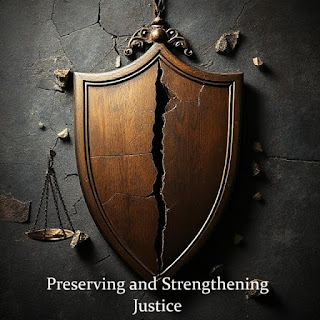In these metaphorical “Stephen King” worlds of third-world-style justice, systemic breakdowns are all too common: insiders are protected or rewarded despite misconduct, while outsiders are swiftly and immorally punished—especially when there is something to be gained from their harm (i.e. in our example those who are seen as local and those not but being underpinned by a narrow slice of life perspective.). When hate and corruption infect the decision-making process, the purpose of law begins to unravel. Long-term consequences and the sanctity of legal frameworks are cast aside, replaced by personal or factional agendas.
For the sake of reflection, let us imagine a system devoid of checks and balances—one where clans dominate, victims are intentionally targeted, and justice is selectively applied. If such behavior is tolerated or encouraged, what does that say about the future of our society? (philosophy and science should match here). When a small group holds more rights and privileges than the collective population, the implications are alarming. To ignore the risks of this emerging philosophical reality is to neglect our duty to protect institutions meant to serve the many, not the few.
No matter how much harm is done, those complicit often fail to defend the uphold certain social contracts that a minority of people may not agree with (We may have a Constitution and other artifict that define what they mean.). The most meaningful response to entrenched hate and corruption is to recognize it—with a certain compassion—because only those trapped in their own cultural or ideological conditioning could justify dismantling trust for personal gain. Though their actions may be steeped in corruption, society is increasingly aware of the harm being done.
Ironically, hate and corruption can be instructive. By showing us their destructive nature, they reveal what is truly good and essential in leadership and governance. They underscore the importance of rules, institutions, and the social contract. People of integrity, across backgrounds and beliefs, will uphold these standards for the common good as something they all believe in. Those lacking in ethical maturity often resort to legal manipulation, weakening institutions for social, political, or economic benefit. If public trust continues to erode while such behaviors occur, it will not be by accident—it will be the result of intentional moral failures (In other words, once you are aware you cannot be unaware and therefore supporting poor behaviors and social contract violations are willful).
This moment should be recorded in our story as one of high and low choices. Yet, those who still believe in a greater good—who support institutions and strive to improve them—will continue to pursue excellence. Corruption and hate remain the enemies of justice and effective governance. It is a moral imperative to climb to the next rung of integrity and accountability. As a people we have something to gain or loose based on how we draw or detract societal buy in. Wise people always adapt and improve where warranted while less developed people make choices for lower order gains.
While many may view themselves as part of a larger collective ideal, some do not. That is why they may be willing to openly violate fundamental values, spread rumors, block individuals from employment, ostracize others, endanger children, manipulate the elderly, and engage in patterned behaviors that suggest these actions have long been part of their playbook. In our learning example, justice was not served. Instead, hate and corruption prevailed, and in the absence of accountability, victims were dehumanized. They are left with no recourse that doesn’t lead to further harm and aggression. All the checks and balances are gone....
And yet depite the minority of rascals that misuse institutional purpose, most people do the right thing. They act with integrity, they work honorably, and they contribute meaningfully to society (The vast majority of officials being good and kind people with the right intent toward others.). A small number may undermine trust and fairness, which is precisely why functioning checks and balances are essential. Without them, we may one day find ourselves, as in this example, with no defense against misconduct. The case illustrates what happens when individuals are dehumanized—based on race, religion, politics, or social networks—and excluded from the protections of justice.In response, we must remain positive, polite, and persistent—grounding ourselves in moral and strategic clarity. As society progresses, ignorance will give way to greater awareness and light. We will choose to write a better ending—one that benefits the greatest number of people. We must only envision what our forefathers/mothers intended and that is full human suffrage. Those who swear oaths to the highest principles know what is on the table and will support that which protects those generation to generation principles that define us. Let us write the narrative of our futures well and with reflective insight.
*This is part of a philosophical theoretical thought experiment on how to preserve and strengthen ceretain democratic underlining principles that encourage strong economic and social resilience. Take with a grain of salt. It is for learning purposes and we will write in a positive end. Feel free to leave a comment.



No comments:
Post a Comment